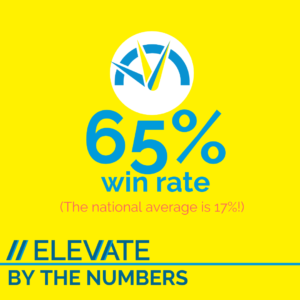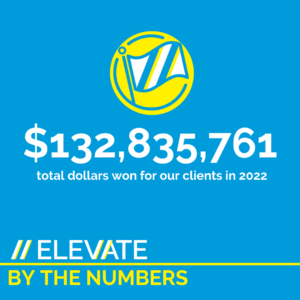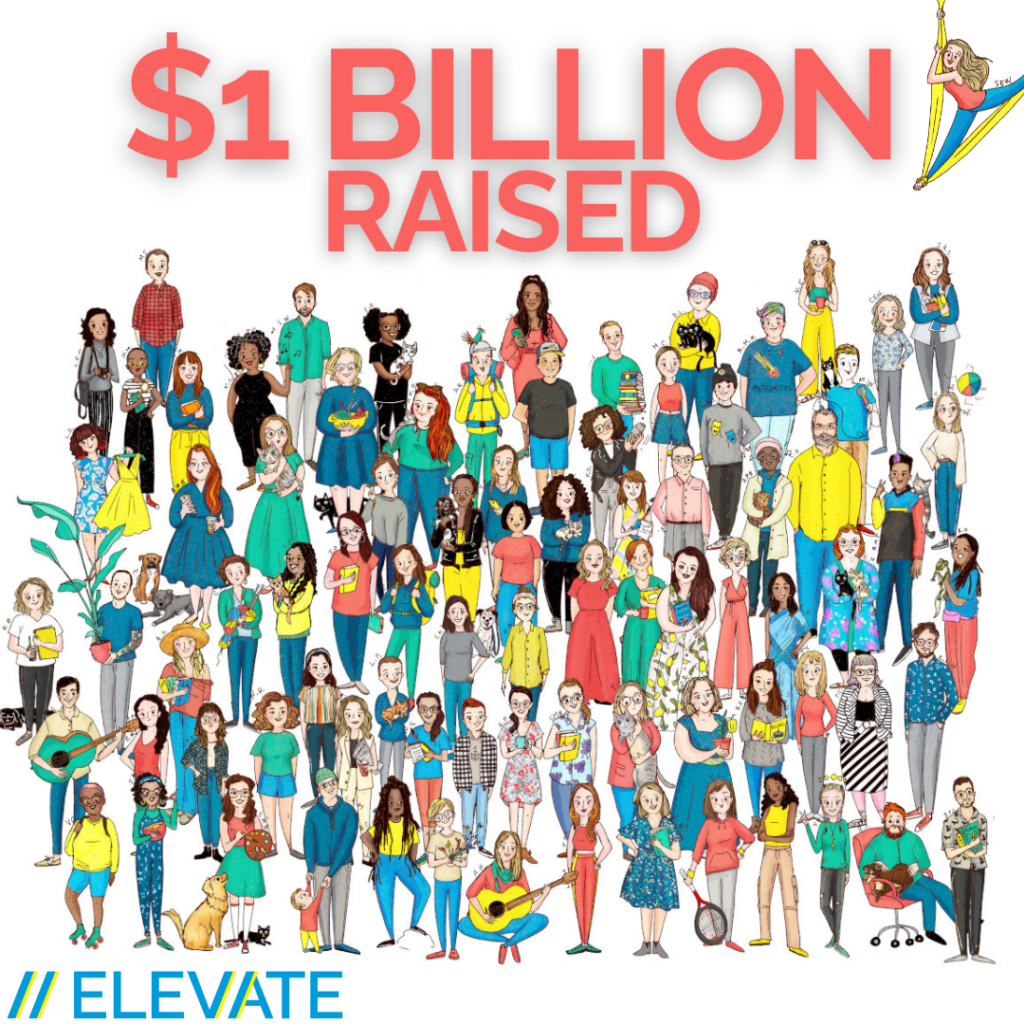Here at Elevate, we have a lot to be proud of, and we aim to celebrate wins large and small. Our hardworking team – 80+ talented grant strategists, writers, and data specialists – work side by side with approximately 100 nonprofits nationwide to secure the resources needed to make a difference across a wide spectrum of issues. We’re proud of each win – from the $10,000 grant from a new partner to the seven-figure award that catapults an organization to the next level of impact. But sometimes, the numbers are so staggering we have to take a minute to pause, reflect, and celebrate!
To that end, we are incredibly proud to share the news with you that:
 Let’s pause for a minute and let this all sink in. If you, like me, lose count past a few zeros, here are a few ways to conceptualize just what a large sum one BILLION is…
Let’s pause for a minute and let this all sink in. If you, like me, lose count past a few zeros, here are a few ways to conceptualize just what a large sum one BILLION is…
- One billion stars equals 1/100 of the Milky Way
- One billion people is one eighth of the world’s population
- One billion seconds is almost 32 years
- One billion steps would result in 15 trips around the equator
Obviously a lot has gone into achieving this milestone over the last 10+ years. Our 2023 Elevate by the Numbers post will give you some idea of the impressive metrics it takes just to win over $100 million annually (which we have succeeded in doing for the last three years). We’re also proud that this cumulative figure includes $11 million in funding our clients won as part of Mackenzie Scott’s highly competitive 2023 Yield Giving Open Call.
Executive Director Sonja Allen offers powerful testimony of how working with Elevate has benefited one such client, Yield Giving winner Friends of Guest House, a Northern Virginia nonprofit that provides housing and reentry services for women who have experienced incarceration: “Elevate’s service model ensures we can raise the funds we need to make a difference in the lives of the women we serve. We are fortunate to have such a strong partner in our mission.”
I’m certain that I speak for all of our staff when I say that it is immensely rewarding to know that this money is going to support the delivery of vital direct services as well as systems change and advocacy efforts in communities across the nation.
Interested in learning more about the clients we serve? Check out this 2023 Meaningful Wins blog. You can also learn more about working with Elevate and our services here.
In spring 2023, MacKenzie Scott’s Yield Giving launched an open call for community-led, community-focused organizations. It received over 6,000 applicants, including 31 Elevate clients who participated. At long last, in March 2024, 361 awards were announced. The process was rigorous, and each organization that participated deserves major kudos!
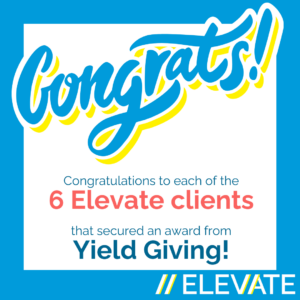
Elevate is thrilled to share that six of our nonprofit partners were selected as awardees in Yield Giving’s 2023 Open Call. All together, these organizations secured $11 million in funding from Yield Giving for their crucial work in housing, substance use treatment and prevention, education, advocacy, and more. Five of Elevate’s clients were among the top tier of applicants and received $2 million each, and one organization was selected for the next tier and received a $1 million award.
Ultimately 1 out of 5 Elevate clients who applied won (compared to 1 out of 17 for the overall pool.)
Of course, Yield Giving was just one of many competitive opportunities Elevate teams and clients pursued (and secured!) in the past year. We are proud of all of the wins – large and small – that each of our clients secure to advance their important work.
For more on how we measure success at Elevate, check out our 2023 By the Numbers and 2023 Meaningful Wins blog posts! We look forward to continuing to partner with and support ALL of our nonprofit clients in 2024 and beyond!
As we reported in our most recent blog, Elevate closed out 2023 by helping our clients win in excess of $100 million in grant funding! (Balloons effect) Because we meticulously collect data on our work with clients, we know that the average and median grants were $131,000 and $30,000, respectively. However, the size of a grant only tells part of the story. A grant of ANY size can have a significant impact on an organization. A grant may be particularly significant because it is the result of a new funder relationship or an award from a current funder for a new priority. An award may be significant because it supports expansion of current work or new initiatives, or builds capacity to help an organization grow and develop as it moves into a new phase of its life cycle.
Accordingly, we are excited to spotlight just a few of last year’s meaningful wins that helped our partner organizations achieve their fundraising objectives.
Jewish Family Service of the Desert Awarded $200,000 from the Houston Family Foundation
 Founded on the Jewish principle of healing the world, Jewish Family Service of the Desert has addressed the social services needs of the Jewish and general community throughout California’s greater Coachella Valley for over 40 years. JFS of the Desert serves thousands of people a year with mental health, school counseling, emergency assistance, and special programming. The organization started working with Elevate in 2023 as one of its Comprehensive Grant Writing Services (Comprehensive Grant Writing Services) clients.
Founded on the Jewish principle of healing the world, Jewish Family Service of the Desert has addressed the social services needs of the Jewish and general community throughout California’s greater Coachella Valley for over 40 years. JFS of the Desert serves thousands of people a year with mental health, school counseling, emergency assistance, and special programming. The organization started working with Elevate in 2023 as one of its Comprehensive Grant Writing Services (Comprehensive Grant Writing Services) clients.
2023 Meaningful Win: Last year, The Houston Family Foundation awarded JFS of the Desert a total of $200,000, with $150,000 allocated to its Case Management Program, providing individuals who are low-income with no-cost assistance in accessing available benefits; and $50,000 to increase current and future access to mental health services in the Coachella Valley.
IN Series Awarded $15,000 from Humanities DC
 IN Series is the standard-bearer for innovative opera theater in Washington, DC. Working with local artists and diverse communities worldwide to create novel works grounded in opera and song, IN Series challenges and reimagines these forms, folding in an expanding range of aesthetic and cultural traditions. The organization has been working with Elevate through Comprehensive Grant Writing Services for five years.
IN Series is the standard-bearer for innovative opera theater in Washington, DC. Working with local artists and diverse communities worldwide to create novel works grounded in opera and song, IN Series challenges and reimagines these forms, folding in an expanding range of aesthetic and cultural traditions. The organization has been working with Elevate through Comprehensive Grant Writing Services for five years.
2023 Meaningful Win: IN Series was awarded a $15,000 grant from Humanities DC to support its Shakespeare Everywhere Festival Scholar in Residence Lecture Series. The lecture series featured Shakespeare scholar, Professor Marjorie Garber, as she discussed The Promised End, an operatic reimagining of Shakespeare’s King Lear featuring the music of composer Guiseppe Verdi. The production and lecture series were produced as part of the Shakespeare Everywhere Festival, with the following partnering institutions: IN Series, Folger Theater, Studio Theatre, Shakespeare Theater Company, Washington Ballet, and the Washington National Opera. You can read more about the Shakespeare Everywhere festival here.
Michigan Environmental Justice Coalition Awarded $50,000 from the Tides Foundation

Michigan Environmental Justice Coalition (MEJC) works to achieve a clean, healthy, and safe environment for Michigan residents. The organization takes a multi-faceted approach to systems change by aligning on intersectional goals with statewide power-building organizations and small grassroots groups for policy change and disruption. MEJC became an Elevate Comprehensive Grant Writing Services client in 2022.
2023 Meaningful Win: The Healthy Democracy Fund, a fund of Tides Foundation—a grantmaking initiative that is committed to building a more inclusive democracy by shifting power to leaders and communities who have been historically excluded from participating in our nation’s future—awarded MEJC $50,000 to support its general operating costs for planned civic engagement work. This win is particularly meaningful as it represents a shared goal between MEJC and its funding partners around shifting power to—and building power within—impacted communities to change the status quo.
Jewish Family Service of Seattle Awarded $40,000 from the Boeing Employees Community Fund
 Inspired by Jewish values, JFS of Seattle helps individuals and families in Puget Sound, Washington achieve well-being, health and stability through a range of supports that include financial assistance, outreach and education, and services for refugees and immigrants, older adults, and people with disabilities. JFS of Seattle is one of Elevate’s oldest Comprehensive Grant Writing Services clients: our partnership is 8 years strong (and counting!)
Inspired by Jewish values, JFS of Seattle helps individuals and families in Puget Sound, Washington achieve well-being, health and stability through a range of supports that include financial assistance, outreach and education, and services for refugees and immigrants, older adults, and people with disabilities. JFS of Seattle is one of Elevate’s oldest Comprehensive Grant Writing Services clients: our partnership is 8 years strong (and counting!)
2023 Meaningful win: One of JFS Seattle’s priorities is supporting and welcoming immigrant and refugee communities to the Puget Sound region. A $40,000 award from the Boeing Employees Community Fund in September 2023 allowed JFS of Seattle to purchase a minivan for the purposes of transporting folks who are resettling in the area. For example, the van will be used to pick up newly arrived refugees from the airport, accompany clients to registration appointments for benefits or to medical appointments, transport clients to appointments for enrolling their children in school or in English language classes, and transport clients to job interviews.
GALA Hispanic Theatre Awarded nearly $80,000 from Learn24 Out of School Time
 GALA (Grupo de Artistas LatinoAmericanos) Hispanic Theatre is a National Center for Latino Performing Arts in Washington, DC. Since 1976, GALA has been promoting and sharing the Latino arts and cultures with a diverse audience, creating work that speaks to communities today, and preserving the rich Hispanic heritage for generations that follow. By developing and producing works that explore the breadth of Latino performing arts, GALA provides opportunities for the Latino artist, educates youth, and engages the entire community in an exchange of ideas and perspectives. GALA is a Comprehensive Grant Writing Services client that has partnered with Elevate for eight years.
GALA (Grupo de Artistas LatinoAmericanos) Hispanic Theatre is a National Center for Latino Performing Arts in Washington, DC. Since 1976, GALA has been promoting and sharing the Latino arts and cultures with a diverse audience, creating work that speaks to communities today, and preserving the rich Hispanic heritage for generations that follow. By developing and producing works that explore the breadth of Latino performing arts, GALA provides opportunities for the Latino artist, educates youth, and engages the entire community in an exchange of ideas and perspectives. GALA is a Comprehensive Grant Writing Services client that has partnered with Elevate for eight years.
2023 Meaningful Win: GALA received $79,984.00 in grant funding from Learn24 Out of School Time in support of Paso Nuevo, the organization’s free, year-round bilingual, inclusive theatre education program offered to high school students between the ages of 14 and 19. In addition to providing acting training, playwriting, and mentorship, students can earn community service hours, receive performance stipends, go on field trips, and train for future employment and leadership opportunities.
We are so pleased to share with you this small sample of the hundreds of meaningful wins our clients secured with the support of their Elevate teams in 2023! If you work with a nonprofit and are interested in learning about how Elevate can help you meet your fundraising goals, learn more about our services here and please get in touch!
For those of you who are regular readers of Elevate’s blog, you know what time it is. (And for those who are new readers, you are about to get a snapshot of what we are all about.). ‘Tis the season to celebrate the past year’s accomplishments while also reviewing the data related to our work and examining underlying trends. Because we at Elevate always look for the stories that data tells us. So without further ado, I introduce to you . . . 2023 Elevate by the Numbers.
Elevate’s Win Rate is Over 50% and Our Median Grant Is Up!
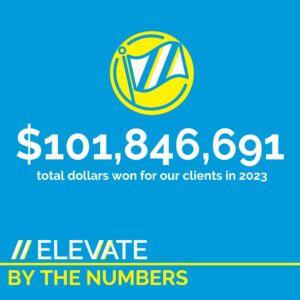 At the risk of sounding boastful, we are thrilled to share that in 2023, we secured over $100 million in grant funding for our clients. We’ve now hit this milestone for the third year in a row! While this NINE FIGURE total is certainly impressive, more importantly, we recognize that it represents the sum of both the larger and smaller awards that are equally vital in meeting our clients’ revenue goals. The average grant we won with our clients last year was over $131,000, and our median grant award was $30,000 (up from $25,000 in 2022). We also won the majority (56%) of all grants that we submitted and that were closed for the year. This is considerably higher than estimated national win rates (an estimated 18% of all grants submitted nationally are awarded).
At the risk of sounding boastful, we are thrilled to share that in 2023, we secured over $100 million in grant funding for our clients. We’ve now hit this milestone for the third year in a row! While this NINE FIGURE total is certainly impressive, more importantly, we recognize that it represents the sum of both the larger and smaller awards that are equally vital in meeting our clients’ revenue goals. The average grant we won with our clients last year was over $131,000, and our median grant award was $30,000 (up from $25,000 in 2022). We also won the majority (56%) of all grants that we submitted and that were closed for the year. This is considerably higher than estimated national win rates (an estimated 18% of all grants submitted nationally are awarded).
Elevate Clients are Making a Difference in 47 Cities
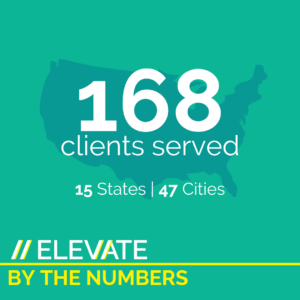 Last year, we worked in partnership with 168 nonprofit organizations, hailing from 15 states and 47 cities across the nation, with Washington DC, Los Angeles, and Philadelphia-based organizations leading the pack with the largest shares of our client portfolio. The nonprofits that collaborate with Elevate work in a variety of sectors: Health, Human Services, & Housing; Education & Training; and Advocacy, Policy, & Organizing represent the three largest categories of Elevate clients. Our clients’ budgets range from from $400,000 to over $1 billion, with a median annual budget of $2.5 million.
Last year, we worked in partnership with 168 nonprofit organizations, hailing from 15 states and 47 cities across the nation, with Washington DC, Los Angeles, and Philadelphia-based organizations leading the pack with the largest shares of our client portfolio. The nonprofits that collaborate with Elevate work in a variety of sectors: Health, Human Services, & Housing; Education & Training; and Advocacy, Policy, & Organizing represent the three largest categories of Elevate clients. Our clients’ budgets range from from $400,000 to over $1 billion, with a median annual budget of $2.5 million.
Because we understand that organizations have different needs based on the stage of their grants program, their capacity, and their strategic fundraising goals, Elevate does not work in a one-size fits all manner. While the majority (96) of our clients opt for our signature Comprehensive Grant Writing Service or our Ongoing Writing Retainer, we also provide start-up support through Grants Accelerator Projects and project-based writing capacity through our Writing Capacity Projects. In 2023, 16 organizations partnered with Elevate on GAPs and 25 engaged us for WCPs.
Elevate Teams Drafted & Submitted Nearly 3,000 Deliverables for Clients
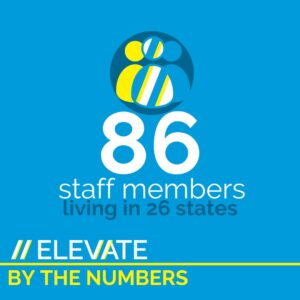 You may be asking what it takes to win $100 million in grant funding. It obviously takes a lot of hard work by our talented Elevate staff (check out our swell team); more concretely, we submitted a total of 2,912 grant proposals, concept notes, reports, and letters of inquiry last year. To get the job done, we racked up in excess of 2 million zoom meeting minutes by attending over 15,000 virtual meetings in 2023. As a fully remote workforce, our 86-member staff reside in 26 states. And last year, Elevate invested $41,000 in staff professional development to support our team in developing their knowledge of IDEA+J, nonprofit financials, fundraising trends, and other topics that are relevant to our clients’ success.
You may be asking what it takes to win $100 million in grant funding. It obviously takes a lot of hard work by our talented Elevate staff (check out our swell team); more concretely, we submitted a total of 2,912 grant proposals, concept notes, reports, and letters of inquiry last year. To get the job done, we racked up in excess of 2 million zoom meeting minutes by attending over 15,000 virtual meetings in 2023. As a fully remote workforce, our 86-member staff reside in 26 states. And last year, Elevate invested $41,000 in staff professional development to support our team in developing their knowledge of IDEA+J, nonprofit financials, fundraising trends, and other topics that are relevant to our clients’ success.
Elevate Can Also Get Down
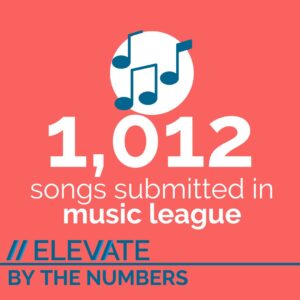 Lest you think that all of this business leaves no time for pleasure, you’d be wrong. Elevate knows how to party. Last year, we celebrated our 10th anniversary in style at the LINE hotel in Washington, DC, closing the night out with 100 sweet cupcakes. We also jammed to 1,012 songs as part of the wildly competitive Elevate Music League. When we weren’t eating, dancing, and partying, we managed to welcome four precious new Elevate tykes – congrats to the new parents!
Lest you think that all of this business leaves no time for pleasure, you’d be wrong. Elevate knows how to party. Last year, we celebrated our 10th anniversary in style at the LINE hotel in Washington, DC, closing the night out with 100 sweet cupcakes. We also jammed to 1,012 songs as part of the wildly competitive Elevate Music League. When we weren’t eating, dancing, and partying, we managed to welcome four precious new Elevate tykes – congrats to the new parents!
Interested in being a part of this winning team or perhaps learning more about our different client services to see how we might support your organization? You can find more information about our services here, or click here to learn more about open positions at Elevate.
Just the grants, please!
Picture It: Grant Writing Nightmares!
Nightmare 1: Imagine, you are the Director of a nonprofit’s small but mighty Development Team. Everything is going swimmingly…until the day your indispensable grant writer sheepishly asks to schedule some catch-up time on your calendar. It turns out they have secured an exciting new career opportunity! You smile winsomely and wish them well, but inside, you just died a little bit. You keep thinking about that overflowing grants calendar and the extra work that is going to fall to you or your other colleagues while things get sorted.
Hiring and training a replacement grant writer is a process. It took you 4 months to find the last one, who stayed with the organization for just over one year. During the last grant writer search, you missed deadlines for important grant reports and renewals. And one long-time funder became irritated with the lack of coordination and pulled their support… Your mind is spinning with all of the worst-case scenarios that simply cannot happen again.

Nightmare 2: Now imagine you are the Development Director for a nonprofit entering into an exciting transitional period. Program staff is in tune with emergent needs of the community and developing exciting and impactful new programs that are resulting in tons of new interest in the organization. The proverbial phone is ringing off the hook with new funders and partners who want to support the organization’s work. The Executive Director and the Board are looking to the Development team to increase revenues in line with program growth. Up until now, you’ve been keeping all those fundraising balls in the air — managing major donors, overseeing the grants calendar, prospecting new funding leads, and planning successful events. But now, you’re starting to wake up in the middle of the night in a cold sweat!
You know that soon, something’s gotta give, whether it is long-term planning, maintaining corporate relationships, or wooing major donors.
QUIZ TIME!
What would you do if you were the Development Director in one of these nightmare scenarios?
A – Text a friend and plan a coffee date to vent about your to-do list.
B – Roll up your sleeves and get to work.
C – Call Elevate!
D – Both A and C
Reclaim Your Time: Elevate’s Ongoing Writing Retainer Service To the Rescue
The correct answer is D, which also stands for “Don’t despair!” That’s because Elevate has got you covered with our Ongoing Writing Retainer Service (OWR)!
Our signature service at Elevate is Comprehensive Grant Writing Services, which offers you a suite of grant program strategy advice and planning, grant calendar and data tracking, project management, prospect research, cultivation support, and full-service grant writing.
While for many organizations this is the solution they need, we’ve learned in our ten years of work with nonprofit clients that, from time to time, organizations simply need a boost in grant writing capacity. In response, we launched a streamlined retainer package in 2022 to help nonprofits through capacity challenges such as the ones described above. We call this service an Ongoing Writing Retainer (OWR).
The OWR matches an organization with a professional grant writer that works to focus exclusively on drafting, editing, and submitting written deliverables – grants, LOIs, and reports – thereby freeing up your internal team’s capacity for other important tasks.
The OWR might be the right Elevate service for you if you already:
- Develop and plan your own annual fundraising goals and strategy;
- Have a planned grants calendar and successfully track all funder deadlines and cultivation history internally;
- Research new funding opportunities, draft funder outreach materials, and track progress toward cultivation targets internally.
The right support at the right time: Elevate and Cavalry Women’s Services
Cavalry Women’s Services, a Washington, DC-based nonprofit that ensures women have access to the proper trauma-informed healthcare and educational support they need to take positive steps toward independence, engaged Elevate for an Ongoing Writing Retainer in early 2023.
Calvary came to Elevate with a solid grants program, at a time when they were planning ahead for their Director of Institutional Advancement to step away from work for a period of leave and a temporary need for capacity to their internal grant writer planned to be away for personal leave. With a strong grants program and a clear calendar of opportunities in place, they sought Elevate’s support to write and submit their grants.
 We paired Calvary with one of our expert grant writers who quickly acquainted themselves with the organization and its programming. Calvary assigned up to four deliverables per month to their Elevate grant writer, including proposals and grant reports.
We paired Calvary with one of our expert grant writers who quickly acquainted themselves with the organization and its programming. Calvary assigned up to four deliverables per month to their Elevate grant writer, including proposals and grant reports.
The Elevate writer met with our point of contact at Calvary briefly on a biweekly or as-needed basis to confirm details and deadlines, receive assignments, and discuss what information was needed to prepare the grants. Elevate handled each step of the drafting process—from planning, drafting, editing, attachment gathering, through to submission. Meanwhile, the team at Calvary was free to focus on other development responsibilities while knowing that their grants submissions could rest in Elevate’s capable hands.
When asked about her experience working with Elevate on an Ongoing Writing Retainer, Heather Laing, Chief Development Officer and our main Point of Contact at Calvary, shared:
“When we had a temporary vacancy on our team, Elevate’s Ongoing Writer Retainer service met our grant writing capacity needs. Elevate was invested in our success in a genuine way, and it was a gift to have a fresh perspective on our grant language.”
Interested in what an Ongoing Writing Retainer or one of Elevate’s other services can do for you? Get in touch so that we can answer your questions, and you can spend more time where your energy is needed most, whether that’s building relationships with your funding partners, implementing your programs, or enjoying more coffee dates with your BFF.
I had the opportunity to sit down with one of those partners, April Walker, founder of Philanthropy for the People for an Elevate Q&A, the first in a series of blogs where we “pass the mic” to another member of our extended community to gain their personal perspective on issues relevant to the philanthropic sector and nonprofits. These conversations are exciting to Elevate as they lift up the opinions and expertise of our partners — which sometimes differs from the perspectives of Elevate’s leadership or readers. We believe that rich dialogue and difference of viewpoints makes this work more meaningful.
In my conversation with April, the first of our Elevate Q&A sessions, she shared her perspective and advice for organizations seeking to center equity and inclusion in their work. She also offered her thoughts on the limitations and challenges inherent in institutional philanthropy and fundraising – plus some advice for grant professionals and nonprofits. Here, I share some of the highlights of our discussion.
Institutional Philanthropy as an Imperfect Solution
Every day, nonprofits navigate the uncomfortable realities of power dynamics and disparities inherent in grantmaking. I asked some questions that explore these tension points and how it is possible to embrace an alternative value system while attempting to meet an organization’s budgetary needs.
Johnisha Levi: Institutional philanthropy is an imperfect solution to societal need, in part because it is the product of inequitable wealth transfers. Given this reality, what do we do to challenge and disrupt this system while society has yet to undertake the necessary systemic and structural reform to replace this entrenched system?
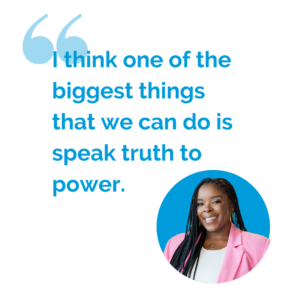 April Walker: When I started in the field, folks were not quite as bold as they are now. Now they are starting to say, “Hey, you over there with all that wealth that you amassed in a problematic way, or that you inherited, we see a problem with that. And not only do we see a problem with that, we’re challenging that because we don’t trust exactly where the money came from, or we see that you’re limiting how you actually show up inside of the values you purport to have. We see that you’re asking us questions that you yourself don’t live by.”
April Walker: When I started in the field, folks were not quite as bold as they are now. Now they are starting to say, “Hey, you over there with all that wealth that you amassed in a problematic way, or that you inherited, we see a problem with that. And not only do we see a problem with that, we’re challenging that because we don’t trust exactly where the money came from, or we see that you’re limiting how you actually show up inside of the values you purport to have. We see that you’re asking us questions that you yourself don’t live by.”
So with the big players in the philanthropic space, it is getting harder and harder to celebrate the ways in which those dollars are exchanged. They’re not actually losing much, and the demands on celebrating and recognizing them are creating an additional strain for those of us who see the truth of what’s happening. It’s not necessarily an indictment of individual wealthy people or of all foundations of all sizes. but it is a request and growing demand for transparency. I think one of the biggest things that we can do is speak truth to power and not just placate, laud, and celebrate people for having huge amounts of resources at their behest—and with that act of calling out comes incredible amounts of power.
JL: When do you think the tide started to change in terms of calling out problems inherent in Philanthropy?
AW: I think within the past five years things have shifted. We’ve seen this as funders invite more conversations about diversity, equity, and inclusion by asking related questions of grantees. As a grant writer or grant professional, if you’re continually having to answer questions about how diverse or not a nonprofit’s board is, or how inclusive or not a program is from a funding entity that is none of those things, it is going to continue to expose these inequities.
JL: What is giving as its most ideal? What other models of giving do you recommend we look to for inspiration in our work and in our own lives as givers?
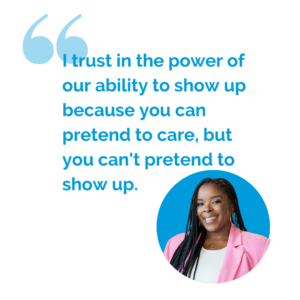 AW: In proportion to what we have as a community and in proportion to what we have been able to amass on a large scale in terms of wealth, Black people are deeply generous. Sometimes it shows up financially, but there is also a generosity of time, of connection, of resources. Members of my family would likely never call themselves philanthropists, but have they put money into a pot to ensure a certain relative can achieve XY and Z dream? Absolutely. Is that a giving circle by the sector’s terms? Absolutely.
AW: In proportion to what we have as a community and in proportion to what we have been able to amass on a large scale in terms of wealth, Black people are deeply generous. Sometimes it shows up financially, but there is also a generosity of time, of connection, of resources. Members of my family would likely never call themselves philanthropists, but have they put money into a pot to ensure a certain relative can achieve XY and Z dream? Absolutely. Is that a giving circle by the sector’s terms? Absolutely.
I trust in the power of our ability to show up because you can pretend to care, but you can’t pretend to show up, whether that means showing up with a plate of food or showing up with $20 or just to lend a hand, and not even needing a thank you. All of that to me counts as generosity where I come from, and there’s a different type of connection in that than when money is at the center and you have to perform a certain way in order to even be in relationship.
Advice for Grant Professionals and Nonprofit Clients
JL: In a recent Cocktails, Conversations & Lessons in Philanthropy episode, you discussed funders’ need for public recognition and celebration and how that is frequently integrated into proposals. How do you recommend that grantees (and the fundraising consultants who work with them) respond to the common (and frankly uncomfortable) question of “How will you publicize our donation?”
AW: There are two applicable buckets. The first bucket is name recognition, or the literal benefits the funder receives for donating—what I call the five star treatment. The other bucket is a funder taking credit for stuff that they didn’t really do—meaning that funding an initiative through-and-through looks very different from making a non-profit apply every year. The former takes a long-term, sustained investment where people do not have to question if this money is going to run out. I wish quite frankly someone would do a case study of how much funders, especially corporate foundations or businesses in general, spend on ensuring that their investments look a certain way versus actually ensuring that their dollars are impactful.
Some grantees may decide that this recognition costs too much emotionally or mentally; other times, this may extend to telling the foundation this truth. It really comes down to being clear on how much risk your organization can assume. I’m also a huge advocate of telling other funders about their peers. I think at the end of the day, when you have a relationship with a funder who is deeply understanding—who does show up inside of their application in a way that’s not making you and your vision feel small—that it’s an opportunity to say, “Hey, I really appreciate your process for all of these reasons, and here’s how we also are engaging with other folks differently.”
JL: Funders are fixated on the idea of metrics and measurements, often to the detriment of smaller, less resourced organizations that are doing great work that is not necessarily measurable in the way that they demand. How do we evolve from this need to quantify? What have you seen other funders doing as an alternative? And how do we move away from the status quo?
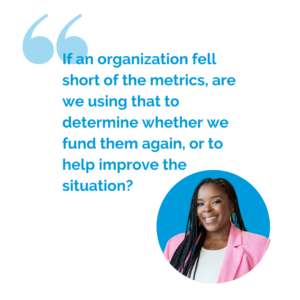 AW: There are funders that will ask for anecdotes in lieu of metrics or measurements, including asking for successes and challenges encountered. I quite prefer those questions. My personal and ever-growing feeling is that funders who want metrics should collect them themselves. Nonprofits need not be experts in all things. You want someone that’s really skilled in data analysis and measurement, if you as a funder have a specific focus on funding poverty in this local community, is it not incumbent upon you to collect the data that you need to prove that you are funding it in the right way? I don’t know many nonprofits that can pay a data expert what they’re worth.
AW: There are funders that will ask for anecdotes in lieu of metrics or measurements, including asking for successes and challenges encountered. I quite prefer those questions. My personal and ever-growing feeling is that funders who want metrics should collect them themselves. Nonprofits need not be experts in all things. You want someone that’s really skilled in data analysis and measurement, if you as a funder have a specific focus on funding poverty in this local community, is it not incumbent upon you to collect the data that you need to prove that you are funding it in the right way? I don’t know many nonprofits that can pay a data expert what they’re worth.
Nonprofits are interested in the data too—we want to know that we are doing the “thing”—but we are also interested in the reality of the thing and data doesn’t give us all of that narrative. The question is really one for funders to start asking themselves. Given you as the funder have set your own focus areas and funding priorities, how do you plan to go about getting that information from nonprofits that you can see are under-resourced? And even what funders do get from nonprofits is not always the most accurate, most comprehensive, complete story.
I’m also not sure what all these reports are telling people. As someone that used to be a program officer and received grant reports, even I had the question of, “What do we do now?” And if an organization didn’t meet the metrics, are we using that reality that they fell short of the metrics to determine whether or not we fund them again, rather than to determine how we can help improve the situation?
JL: Sometimes as individuals and organizations, we feel powerless to effect change when the problems are so massive. What are some steps or some work that you recommend we can still do to make a difference in our day-to-day work?
AW: Giving into hopelessness and giving up is not a path that we can choose. You have days that are challenging and demoralizing, but you can look up any number of leaders in the sector that remind us to be hopeful. Equal Justice Initiative’s Bryan Stevenson is a great example. And we do have wins along the way!
I’m also finding the people that I can link arms with. I’m not going to spend a huge amount of time on the people that are committed to moving slowly or delaying. I think your day-to-day has to find a balance between, “I have this capacity to fight, but when I feel like I’m at my wits end, I can turn back to the community that I know is bolstering me and take some strength from them.”
I also use my own philanthropy for this purpose. I support the organizations that I believe in and I know are doing good work and that I can trust, and that’s where I designate as much support as I can. I can also show up as a volunteer, I can show up as a board member, or I can just lend time to make an introduction. All of those things still matter inside of a system that is working to save itself, inside of whiteness as a construct that only knows how to defend itself. I have no qualms and no Illusions about how powerful the systems are, but I also won’t doubt my capacity for change and my capacity for impact.
Interested in learning more about alternative models of fundraising that are more community-centered? Check out the 10 principles of Community-Centric Funding developed by fundraisers of color that are grounded in racial and economic justice.
Keep your eye on this space for more ideas and strategies from April in the coming months as well as other Elevate Q&As.
Elevate is excited to share two new partnerships that we have started in 2023 to support our Inclusion, Diversity, Equity, Accessibility, and Justice (IDEA+J) efforts.
Read more below to learn about our partners, our plans, and our journey.
April Walker, Philanthropy for the People
 In February, we kicked off a year-long partnership with Philanthropy for the People, and its founder April Walker. April’s expertise centers specifically on racial equity and justice in fundraising and grantmaking,
In February, we kicked off a year-long partnership with Philanthropy for the People, and its founder April Walker. April’s expertise centers specifically on racial equity and justice in fundraising and grantmaking,
April is facilitating conversations and workshops for Elevate staff about wealth, philanthropy, and fundraising justice throughout 2023. Our aim for this portion of our work is to build a shared vocabulary and understanding among Elevate staff about these topics so that we can be better partners to our clients and drive meaningful change in the nonprofit sector.
April’s unique focus on equity in philanthropy is particularly important to Elevate, given the nature of our work to support nonprofit fundraising in an inherently inequitable philanthropic sector. This context has major consequences for our nonprofit partners, and Elevate is committed to hastening change in the sector.
Interested in hearing more about April’s expertise and her advice on what it will take to transform the philanthropic sector? Look for our next blog installment!
Dominique Hollins, WĒ360: 360° of Workplace Equity
 We have likewise engaged Dominique Hollins, Founder and Connector-in-Chief of WĒ360, to conduct a company-wide equity audit. Our work with Dominique is internally-focused and designed as the primary information-gathering step in developing Elevate’s long-term IDEA+J strategy.
We have likewise engaged Dominique Hollins, Founder and Connector-in-Chief of WĒ360, to conduct a company-wide equity audit. Our work with Dominique is internally-focused and designed as the primary information-gathering step in developing Elevate’s long-term IDEA+J strategy.
Dominique will conduct a company-wide IDEA+J assessment that highlights strengths and areas of development for sustainable IDEA+J implementation in the years to come. Her assessment will include surveys of Elevate staff and a review of relevant internal policies and procedures. This information will inform the design of our long-term IDEA+J strategy. We intend to repeat this assessment every two to three years to measure and evaluate progress.
Dominique is a sought-after consultant, coach and speaker who has been quoted in the Washington Post and recognized by Fortune for her work. She develops customized strategies that bridge the gap between corporate responsibility and organizational accountability to enable equitable and inclusive business practices.
Why Two Partners?
Elevate strives to be an inclusive and equitable workplace where all members of staff are accepted and recognized for their contributions. It is therefore critical that any work we do to advance diversity, equity, and inclusion is inclusive of our company operations and practices.
At the same time, Elevate operates within the larger context of the nonprofit and philanthropic sectors, as we support our clients in their pursuit of funding from institutional donors. Our clients are in part dependent on the largesse of donors, and we are cognizant that philanthropy itself is inherently imperfect. Philanthropy writ large is a product of the income inequality and disparity rooted in a capitalist system – a system in which much of this country’s wealth is and always has been generated by Black, Brown, and immigrant laborers.
So, when tasked with identifying the right partners to support Elevate’s journey, the IDEA+J working group identified the need for two partners with distinct expertise who could support our work with both an internal and an external focus. While it took some time to lay the foundation for these two partnerships, we are optimistic that our collaborations with April and Dominique will facilitate the holistic and multidimensional approach to diversity, equity, and inclusion that we’ve been looking for.
Laying the Groundwork
At Elevate, we believe that to build a workplace that is inclusive and equitable requires a values alignment, an invested leadership team, financial resources, and staff capacity for a sustained, long-term commitment, as the work is quite simply never finished if it is substantive rather than performative.
Individual Elevate staff members have consistently expressed enthusiasm and demand for the company to invest more in Diversity, Equity, and Inclusion work. While wanting very much to heed this call to action, founder, President and CEO Alayna Buckner, wanted to enter into this undertaking responsibly with sufficient internal assets in place. Equally important to Alayna was for Elevate to do its due diligence to avoid engaging in DEI that was superficial, counterproductive, or harmful. This was especially true in light of the proliferation of ill-conceived DEI pledges and initiatives in the wake of the murder of George Floyd and subsequent Black Lives Matter protests in 2020. We also did not want a disproportionate amount of emotional labor to fall on staff belonging to marginalized communities, as often happens when initiatives are entirely staff-directed. Finally, we wanted to look both inward at ourselves and our organization and outward to our sector to better understand how intrinsic injustice and power imbalances are to the core of fundraising.
Accordingly, we made certain we had the financial resources that would allow Elevate to invest in the necessary expertise to guide this journey. We hired Vice President of Personnel, Letese Lamb, to act as the executive sponsor of our DEI initiative. We also reduced staff workloads so that they would have the space to participate in IDEA+J working groups and committees. Then, we undertook a thoughtful year-long partner selection process as an IDEA+J Committee.
Now that we are here, we know that this transformative work will challenge us in ways we may not expect. All the same, we are eager to begin this collective learning journey and to share our progress with you!
Check out a few of our previous blogs for more on how philanthropy is changing and why it is critical that grant writers use empowering language in their funding requests. We also offer a webinar on Power Dynamics in Grant Writing as part of our Learning Collection on How to Prepare Expert Grant Applications. Join us on May 25, 2023 for a session that will explore the role of fundraising in creating equitable partnerships among communities, the social sector, and philanthropy.
You might have noticed that Elevate’s tagline is “Smart Grants for Powerful Social Change.”
Elevate works with over 100 inspiring nonprofit organizations that improve people’s lives and communities. This is the “powerful social change” in our tagline, while “Smart Grants” is in part a reference to one of the essential tools that we use to get better at the work we do every day for our clients: data. Understanding what data tells us about our clients’ grant program outcomes is key to our success. Tracking grant-related data is a unique hallmark of Elevate’s services, and one of the features that sets Elevate apart from other fundraising and grants consultants.
Every year, we review the data related to our work and examine trends and highlights. Our year-end infographic, Elevate 2022 by the Numbers, offers a data snapshot of the preceding 12 months. Our mighty staff of 82 served 162 clients, submitted 2,901 deliverables, (i.e., grants, letters of intent, and reports), and won over $132 million for our clients! Last year, we had a 65% win rate for grants prepared by Elevate.
There is much to celebrate about our clients’ significant grant wins last year! But at Elevate, we do more than acknowledge our client’s triumphs: we also look for significant trends and lessons that can better inform our work with both new and long-time partners in the years to come.
Our 2022 Win Rate: 65%
Last year, our clients won 65% of the grants that Elevate wrote on their behalf. This is an extraordinary success rate – we win two-thirds of all grants submitted, more than three times the national average.
This win rate is a conservative calculation. It only includes opportunities that were drafted and submitted by Elevate on behalf of our clients. However, Elevate also provides advice and language on a client’s own submissions, as well as “softer-touch” aspects of support that may ultimately lead to funding wins, including helping clients cultivate new funders and steward relationships with current funders.
We have searched for a comparable national statistic to gauge our 65% win rate. Based on nonprofit self-reporting, information from Foundation Directory, and raw data, Candid estimates a national average win rate of 17%. Other sources place the average win rate somewhere between 10 and 30%. (We wholeheartedly welcome any alternative sources for national win rate data if you wish to reach out to us!)
Stepping back so that we may assess the bigger picture, our own data set reveals that win rates vary based on factors such as a nonprofit’s tenure with Elevate as well as their budget size.
For instance, there is a bit of a ramp-up in building a new grants program: it can take anywhere from nine to 18 months from the point at which an organization first begins researching grant opportunities to the point when they secure their first grants.
When many partners begin working with Elevate, especially if they are new to grants, the first several months are spent getting to know the organization’s needs, collaborating on a suitable grant strategy, identifying funding opportunities, and building a grants calendar.
For this reason, it is really not until these clients enter year 3 with Elevate when win rates start to consistently approach the 65% mark. This is also why our very long standing clients (those who have partnered with us for 7 years or more) have even higher win rates. In collaboration with these organizations, we have systematically built efficient and sustainable grants programs!
Interestingly, Elevate has witnessed a steady uptick in our overall win rate as our organization has matured. We moved from a 55.6% win rate in 2018 to a 60.7% win rate in 2020 to our current rate of 65%. This progression reflects an increased investment in our staff as well as a high-quality operations team to better support them and our clients. (For more on our organizational investments, check out our Founder’s Elevate is Ten! blog post celebrating our decade milestone.)
Our 2022 Total Dollars Won: $132,835,761
In addition to our team’s impressive win rate, we are very proud to share that we won over $132 million for our clients’ work last year!
There are a lot of ways to parse this nine-figure sum secured by Elevate clients. For our Comprehensive Grant Writing Services clients, Elevate and our clients work collaboratively to decide which opportunities to pursue based on their customized grant strategy for a given year. Other clients may opt to utilize one of our project-based services such as our Writing Capacity Projects to add extra grant capacity for a limited time or to apply for a large grant. Clients’ needs also differ based on numerous factors, including their sector (we partner with organizations working in the areas of arts & culture, education, health & human services, advocacy, and international issues, for example), their mix of local and national funders, their budget size (we work with organizations with budgets under $500,000 to those with annual budgets over $50 million).
Therefore, whether it is a $250 award (our smallest in 2022) or a $7.8 million grant (the largest grant we secured last year), all of our wins are vitally important in helping to sustain our clients’ good works. Between these polar extremes, we calculated an average award of $151,000 and a median award of $25,000 among the grants secured in 2022.
Interested in learning more about how Elevate uses data to serve our clients? Check out our blog on how general operating requests have a higher win rate than program-restricted proposals. Also look out for the “March of Project Coordinators” series next month (we also like puns!) that will illustrate the value of data and project management on our client teams.
ABOUT OUR DATA
Elevate uses Salesforce to log thousands of grant opportunities each year across our nearly 100 nonprofit partners. We track information related to which grants are secured and which are lost, how much funding is requested and awarded, whether each grant is for a specific program area or for operating support, and much much more. The results described here come from thousands of data points across all of Elevate’s nonprofit partners. We love data!
January 12, 2023
Celebrating a decade of partnerships, growth, and meaningful impact
While each new year brings an opportunity for reflection and goal-setting, here at Elevate, we have actually been thinking about 2023 for many months – not just as part of our routine organizational planning for the new year, but also because it is another big milestone for us: our 10th Anniversary Year!
TEN YEARS! I started formulating the idea for Elevate in late 2012, after grant writing for and consulting with nonprofits on my own for a few years. And I officially filed the paperwork in December 2012 so that I could launch the company on January 1, 2013.
First, I am very proud of what we have accomplished. About 20% of private sector businesses in the United States fail within the first year; 50% after five years; and 65% after ten years, according to the US Bureau of Labor Statistics. In contrast, ten years in, Elevate continues to grow and invest in services and our staff. We have exciting plans for the years ahead!
Moreover, per the National Women’s Business Council, we’re in the top 1% of women-owned businesses in the United States in both revenues and staff size – although, to be honest, this may say more about the state of gender equality in our country and business than anything else.
In fact, there is one experience that I remember very clearly from my early days building Elevate: I was in a cohort of other business executives that were working on scaling their companies. There was a panel of three CEOs who were talking about failure, and the role it has in taking risks and experimenting. One man proudly shared that he had started four companies and all of them had failed before his current venture. I remember turning to my colleague (in mild horror!) and saying, “I don’t want to start four companies and watch them fail: I want to start ONE company and make sure it succeeds.”
I know that his intent was to normalize failure; and we all have projects or ideas that do not work out – I certainly have. But from Day 1 of Elevate, I viscerally understood that YOU – our clients – were placing your trust in us: to develop high-quality proposals; to submit them on time and accurately; and to literally raise their budgets and staff salaries. I was in my twenties when I started Elevate, but I knew that this was a profound responsibility and I never took it lightly. I still do not.
In building Elevate, I have worked to ensure we offer high-quality services that meet our clients needs and that we have hired excellent staff to deliver those services. Over the years, we have developed strong training programs (which is still ongoing)! We invested in a management layer that supports staff one-on-one and a Client Services department that moves quickly when clients have concerns. We have reduced workloads so that all staff have more time to focus on each client. We also continue to invest in a high-quality operations team to support staff and clients day-to-day. And most importantly: I have made sure we have a competent and professional executive team of leaders with exceptional judgment.
I bring all of this up because the news is heavy with stories of atrocious corporate governance and irresponsible business leaders: from the collapse of FTX and its grotesque lack of internal accountability; to the decades-long criminal tax fraud of the Trump Organization; to former Theranos CEO Elizabeth Holmes being sentenced to 11 years in prison.
Leaders matter. The decisions we make for our organizations matter. And I have always looked to the nonprofit sector – rather than the corporate sector – for inspiration and guidance about how I wanted to lead Elevate. On this point, I’ll share one final story from Elevate’s founding.
Early on, a colleague and I were meeting with a potential client and explaining our three-person team model. (Yes, we do think it is distinctive and an important part of our value proposition to clients!) However, this person innocently said, “Oh, how innovative…!”
My eyes got wide and I was about to begin my multi-part thesis on why innovation is overvalued and effectiveness is much more important – when, thankfully, my colleague just said, “Don’t get her started…”
But it is true that after a decade of seeing funders prioritize the new and the shiny over the tried and true, I had developed a strong opinion on the matter. My staff who have worked with me long enough know that my favorite poem is To be of use by Marge Piercy (and my not-so-secret goal is for Elevate’s mascot to be the water buffalo).
That is because this poem encapsulates all that I love most about working with and for you – the nonprofit organizations that make people’s lives and communities better. It beautifully reflects how good people, doing hard work, day in and day out is what matters most. It is why I am so proud to have dedicated the last decade to serving you and your organizations. And it is why I am committed to ensuring that Elevate only improves in serving you over the next decade.
To be of use
BY MARGE PIERCY
The people I love the best
jump into work head first
without dallying in the shallows
and swim off with sure strokes almost out of sight.
They seem to become natives of that element,
the black sleek heads of seals
bouncing like half-submerged balls.
I love people who harness themselves, an ox to a heavy cart,
who pull like water buffalo, with massive patience,
who strain in the mud and the muck to move things forward,
who do what has to be done, again and again.
I want to be with people who submerge
in the task, who go into the fields to harvest
and work in a row and pass the bags along,
who are not parlor generals and field deserters
but move in a common rhythm
when the food must come in or the fire be put out.
The work of the world is common as mud.
Botched, it smears the hands, crumbles to dust.
But the thing worth doing well done
has a shape that satisfies, clean and evident.
Greek amphoras for wine or oil,
Hopi vases that held corn, are put in museums
but you know they were made to be used.
The pitcher cries for water to carry
and a person for work that is real.
November 3, 2022
WHY I FOUNDED ELEVATE
I have been a grant writer pretty much my entire career. I always loved the work because it let me write professionally. (Who says a philosophy degree isn’t marketable?!) But more importantly, I enjoyed it because good grant writing makes good things happen. I loved winning proposals for important community projects. As a consultant grant writer, I loved working with nonprofit leaders to identify programming gaps, and find funding to address those gaps.
But having worked in-house at nonprofits, and then as an independent consultant to a handful of organizations, I felt that there were challenges with both models. Too often, I saw early career grant writers hop from organization to organization in order to grow their skills, advance their careers, and be exposed to different types of grants and organizations. (And, yes, I was guilty of this myself!) These nonprofits were likewise spending six or nine months training a relatively inexperienced grant writer, and then losing them after a year or so, only to re-start the expensive hiring, onboarding, and training process. And in the meantime, their grants programs stalled.
Later, as an independent contractor, I got to work with a lot of nonprofits and gain expertise on diverse topics quickly – but I missed having a team of other people to work with. I wanted to share advice, cultivation strategies, program ideas, and trends in the sector. I wanted to invest in the best research tools and have a robust grants database that would benefit all of my clients! And, I noticed that nonprofits were stuck in an inefficient position by paying me hourly. It is expensive to pay independent contractors who have high-level development expertise to also do a lot of the day-to-day work like managing the grant calendar and submitting proposals.
So I started Elevate with a clear purpose, a distinctive team model – and MANY questions.
A PURPOSE, A MODEL…and MANY QUESTIONS
Our purpose, which has never waived, is to ensure nonprofits have access to the best grants expertise in the country.
Our team model has been refined over the years, but remains the foundation on which Elevate is built. It is also how we stand apart from other firms. Simply put, when you work with Elevate, you get a whole team of people with distinct roles, training, and expertise. You get access to a high-level strategist and team manager; the dedicated support of a highly skilled grant writer based on how big your grant calendar is; and you get a data professional to manage your calendar and ensure all of the details are captured. Instead of hiring three people with these distinct skill sets, you can work with Elevate. Instead of trying to find a “unicorn” who can do it all, we hire, train, and support excellent fundraisers – and assign you a team based on your needs.
So, we had a clear purpose and a unique model,but the rest of Elevate was up for discussion, iteration, and improvement. I won’t detail the (literally) thousands of questions that I had – and the hundreds which we have systematically asked and answered over the past decade.
But I will tell you one question I had back then, sitting on my couch, planning Elevate’s future: I did not know if nonprofits would want to work with a firm like Elevate. Or if they would want to keep working with us over time. My clients at that time only knew me; they had hired me; they trusted me. I wasn’t sure if we would be able to translate that expertise over to people they did not know.
But year after year, our nonprofit partners have answered that question with a resounding YES!
QUESTIONS ANSWERED
YES! They want to work with our amazing staff. Our clients appreciate the diverse professional skill sets, past work experiences, and personal perspectives and backgrounds our staff bring to their work.
YES! They will stay with Elevate for years and years. Even as nonprofits have a growing option set of other firms, individual consultants, or in-house staffing, they continue to choose to partner with us to grow and sustain their grants program. They value our consistently high-quality work, our industry-leading win rates and ROI, and the stability we bring to their development departments.
YES! They will stay with Elevate as their needs evolve. Over the years, we have dedicated increasing staff time and leadership to working with clients to make sure they are in the right contract and scope of work to ensure their needs are met even as these needs shift over time.
YES! They trust us – and hold us accountable – to continue to improve our services. This past decade has had its ups and downs: as we have grown, we have improved the quality of our services and increased the consistency of our work. We have worked hard to respond promptly and thoughtfully to client feedback so that we consistently improve our work and the service we provide.
YES! They see the benefits of Elevate’s shared expertise, insight, and resources. Not as competition and scarcity – but as a mutual benefit that supports all of our nonprofit clients. They appreciate that we have a deep bench of expert staff and a long roster of clients.
SPACE TO SUCCEED
A particular part of Elevate’s growth that I am most proud of is that with Elevate’s own expansion, our clients actually get more personalized attention and support than ever before.
As we have grown, we have not cut corners for clients – in fact, we have invested a lot in ensuring that our staff can focus on client work. In 2021, after a long COVID year that hugely impacted the sector, we adopted a priority of providing our team with the “Space to Succeed.” We reduced staff workloads by 20% for Grant Writers and over 10% for Team Directors, meaning our staff have more time and space for each client.
We also built out a stellar team of trained supervisors who support each member of the staff in navigating their work with their clients and teams. And, our excellent Data Team continues to grow and excel, bringing new insights to our work with clients and to the sector as a whole! (See their most recent blog post here.)
As we look ahead to 2023 – our 10th Anniversary Year! – we look forward to continuing to be a trusted partner to over 100 nonprofit partners every day. Thank you to everyone who continues to support us on this journey!


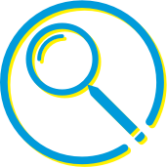



 Let’s pause for a minute and let this all sink in. If you, like me, lose count past a few zeros, here are a few ways to conceptualize just what a large sum one BILLION is…
Let’s pause for a minute and let this all sink in. If you, like me, lose count past a few zeros, here are a few ways to conceptualize just what a large sum one BILLION is…
 Founded on the Jewish principle of healing the world,
Founded on the Jewish principle of healing the world,  IN Series
IN Series
 Inspired by Jewish values,
Inspired by Jewish values,  GALA (Grupo de Artistas LatinoAmericanos) Hispanic Theatre
GALA (Grupo de Artistas LatinoAmericanos) Hispanic Theatre At the risk of sounding boastful, we are thrilled to share that in 2023, we secured over $100 million in grant funding for our clients. We’ve now hit this milestone for the third year in a row! While this
At the risk of sounding boastful, we are thrilled to share that in 2023, we secured over $100 million in grant funding for our clients. We’ve now hit this milestone for the third year in a row! While this  Last year, we worked in partnership with
Last year, we worked in partnership with  You may be asking what it takes to win $100 million in grant funding. It obviously takes a lot of hard work by our talented Elevate staff (check out our
You may be asking what it takes to win $100 million in grant funding. It obviously takes a lot of hard work by our talented Elevate staff (check out our  Lest you think that all of this business leaves no time for pleasure, you’d be wrong. Elevate knows how to party. Last year, we celebrated our 10th anniversary in style at the LINE hotel in Washington, DC, closing the night out with 100 sweet cupcakes. We also jammed to 1,012 songs as part of the wildly competitive Elevate Music League. When we weren’t eating, dancing, and partying, we managed to welcome four precious new Elevate tykes – congrats to the new parents!
Lest you think that all of this business leaves no time for pleasure, you’d be wrong. Elevate knows how to party. Last year, we celebrated our 10th anniversary in style at the LINE hotel in Washington, DC, closing the night out with 100 sweet cupcakes. We also jammed to 1,012 songs as part of the wildly competitive Elevate Music League. When we weren’t eating, dancing, and partying, we managed to welcome four precious new Elevate tykes – congrats to the new parents! 
 We paired Calvary with one of our
We paired Calvary with one of our  April Walker
April Walker AW:
AW:  AW:
AW: In February, we kicked off a year-long partnership with
In February, we kicked off a year-long partnership with  We have likewise engaged Dominique Hollins, Founder and Connector-in-Chief of
We have likewise engaged Dominique Hollins, Founder and Connector-in-Chief of 